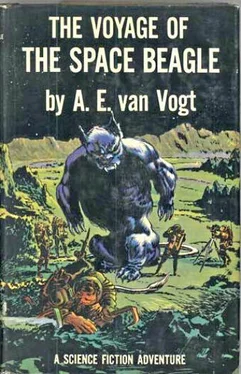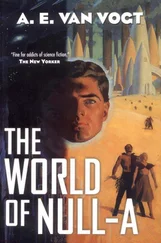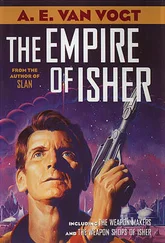Grosvenor made no reply. He had already seen.
De-gravity rafts operated on the same principle as the anti-acceleration drive. The reaction that occurred in an object when inertia was overcome had been found on examination to be a molecular process but it was not inherent in the structure of matter. An anti-acceleration field shifted electrons in their orbits slightly. This, in turn, created a molecular tension, resulting in a small though all-embracing rearrangement.
Matter so altered, acted as if it were immune to the normal effects of speeding up or slowing down. A ship proceeding on anti-acceleration could stop short in mid-flight, even if it had been travelling at millions of miles a second.
The group attacking Grosvenor’s department merely loaded their weapons on to the long, narrow rafts, climbed aboard themselves, and activated them to a suitable field intensity. Then, using magnetic attraction, they drew themselves forward toward the open door two hundred feet away.
They proceeded about fifty feet, then slowed, came to a full stop, and began to back. Then they stopped again.
Grosvenor, who had been busy at his instrument board, came back and sat down beside the puzzled McCann.
The geologist asked, “What did you do?”
Grosvenor answered without hesitation. “As you saw, they propelled themselves forward by pointing directional magnets at the steel walls ahead. I set up a repeller field, which is nothing new in itself. But actually this version of it is a part of a temperature process more related to the way you and I maintain our body heat than it is to heat physics. Now they’ll have to use jet propulsion, or ordinary screw propellers, or even” — he laughed — “oars.”
McCann, his gaze on the viewing plate, said grimly, “They’re not going to bother. They’re going to turn their heater loose. Better shut the door!”
“Wait!”
McCann swallowed visibly. “But the heat will come in here. We’ll roast.”
Grosvenor shook his head. “I’ve told you; what I did was part of a process involving temperature. Fed new energy, the whole metal environment will seek to maintain its equilibrium on a somewhat lower level. There — look.”
The mobile heat blaster was turning white. It was a white that made McCann curse softly under his breath. “Frost,” he mumbled. “But how….”
As they watched, ice formed on the walls and the floors. The heater gleamed in its frozen casing, and a chill blast of air came through the door. McCann shivered.
“Temperature,” he said vaguely. “A somewhat lower equilibrium.”
Grosvenor stood up. “I think it’s time they went home. After all, I don’t want anything to happen to them.”
He walked to an instrument that stood against one wall of the auditorium room, and sank into a chair in front of a compact keyboard. The keys were small and of different colours. There were twenty-five to a row, and twenty-five rows.
McCann came over and stared down at the instrument.
“What is it?” he asked. “I don’t recall seeing it before.”
With a quick, rippling, almost casual movement, Grosvenor depressed seven of the keys, then reached over and touched a main release switch. There was a clear, yet soft, musical note. Its overtones seemed to stay in the air for several seconds after the basic note had died away.
Grosvenor looked up. “What association did that bring to your mind?”
McCann hesitated. There was an odd expression on his face. “I had a picture of an organ playing in a church. Then that changed, and I was at a political rally where the candidate had provided fast, stimulating music to make everybody happy.” He broke off, and said breathlessly, “So that is how you could win an election.”
“One of the methods.”
McCann was tense. “Man, what terrific power you have.”
Grosvenor said, “It doesn’t affect me.”
“But you’re conditioned. You can’t expect to condition the whole human race.”
“A baby is conditioned when it learns to walk, move its arms, speak. Why not extend the conditioning to hypnotism, chemical responses, the effects of food? It was possible hundreds of years ago. It would prevent a lot of disease, heartache, and the kind of catastrophe that derives from misunderstanding of one’s own body and mind.”
McCann was turning back to the mounted, spindle-shaped instrument. “How does it work?”
“It’s an arrangement of crystals with electrical circuits. You know how electricity can distort certain crystalline structures. By setting up a pattern, an ultrasonic vibration is emitted, which by-passes the ear and directly stimulates the brain. I can play on that the way a musician plays on his instrument, creating emotional moods that strike too deep for any untrained person to resist.”
McCann returned to his chair and sat down. He looked suddenly pale. “You frighten me,” he said in a low voice. “I regard that as unethical. I can’t help it.”
Grosvenor studied him; then, turning, he bent down and made an adjustment on the instrument. He pressed the button. The sound was sadder, sweeter, this time. It had a cloying quality, as if endless vibrations continued to throb in the air around them, though the sound itself was gone. Grosvenor said, “What did you get that time?”
McCann hesitated again, then said suddenly, “I thought of my mother. I had a sudden desire to be back home. I wanted—”
Grosvenor frowned, “That’s too dangerous,” he said. “If I intensified that enough, some of the men might curl up again in the womb position.” He paused. “How about this?”
Rapidly, he set up a new pattern, and then touched the activating switch. He drew a bell-like sound, with a soft, soft tinkling in the distant background.
“I was a baby,” said McCann, “and it was bedtime. Gosh, I’m sleepy.” He seemed not to notice that he had reverted to the present tense. Involuntarily, he yawned.
Grosvenor opened a drawer in a table beside the machine, and took out two plastic headpieces. He handed one to McCann. “Better put that on.”
He slipped the other over his own head, while his companion, with evident reluctance, did the same. McCann said gloomily, “I guess I’m just not made to be Machiavellian. I suppose you’ll try to tell me that meaningless sounds have been used before to evoke emotions and influence people.”
Grosvenor, who had been setting a dial pointer, paused to answer. He said earnestly, “People think a thing ethical or unethical depending on the associations that come to their minds at the moment, or while they’re considering the problem in retrospect. That doesn’t mean that no system of ethics has any validity. I personally subscribe to the principle that our ethical measuring rod should be that which benefits the greatest number, provided that it doesn’t include extermination or torture of, or denial of rights to, individuals who do not conform. Society has to learn to salvage the man who is ill or ignorant.”
He was intent now. “Please note that I have never used this device before. I have never used hypnosis except when Kent invaded my department — though of course I intend to do so now. From the moment the trip began, I could have lured people up here by stimulating them in a dozen unsuspected ways. Why didn’t I? Because the Nexial Foundation laid down a code of ethics for itself and its graduates, which is conditioned right into my system. I can break through that conditioning, but only with great difficulty.”
“Are you breaking through it now?”
“No.”
“It seems to me, then, that it’s pretty elastic.”
“That’s exactly right. When I firmly believe, as I do now, that my actions are justified, there is no internal nervous or emotional problem.”
Читать дальше











